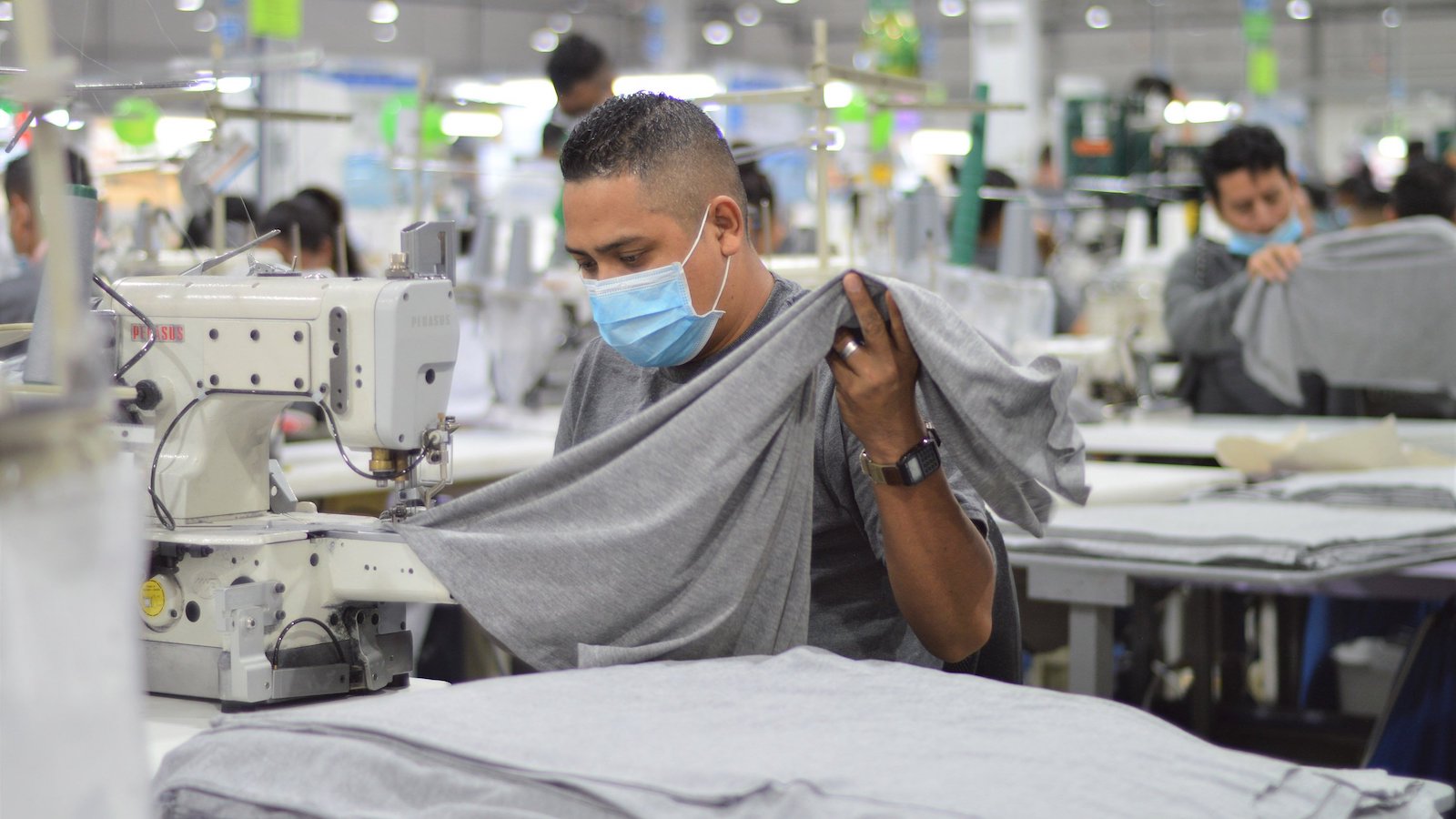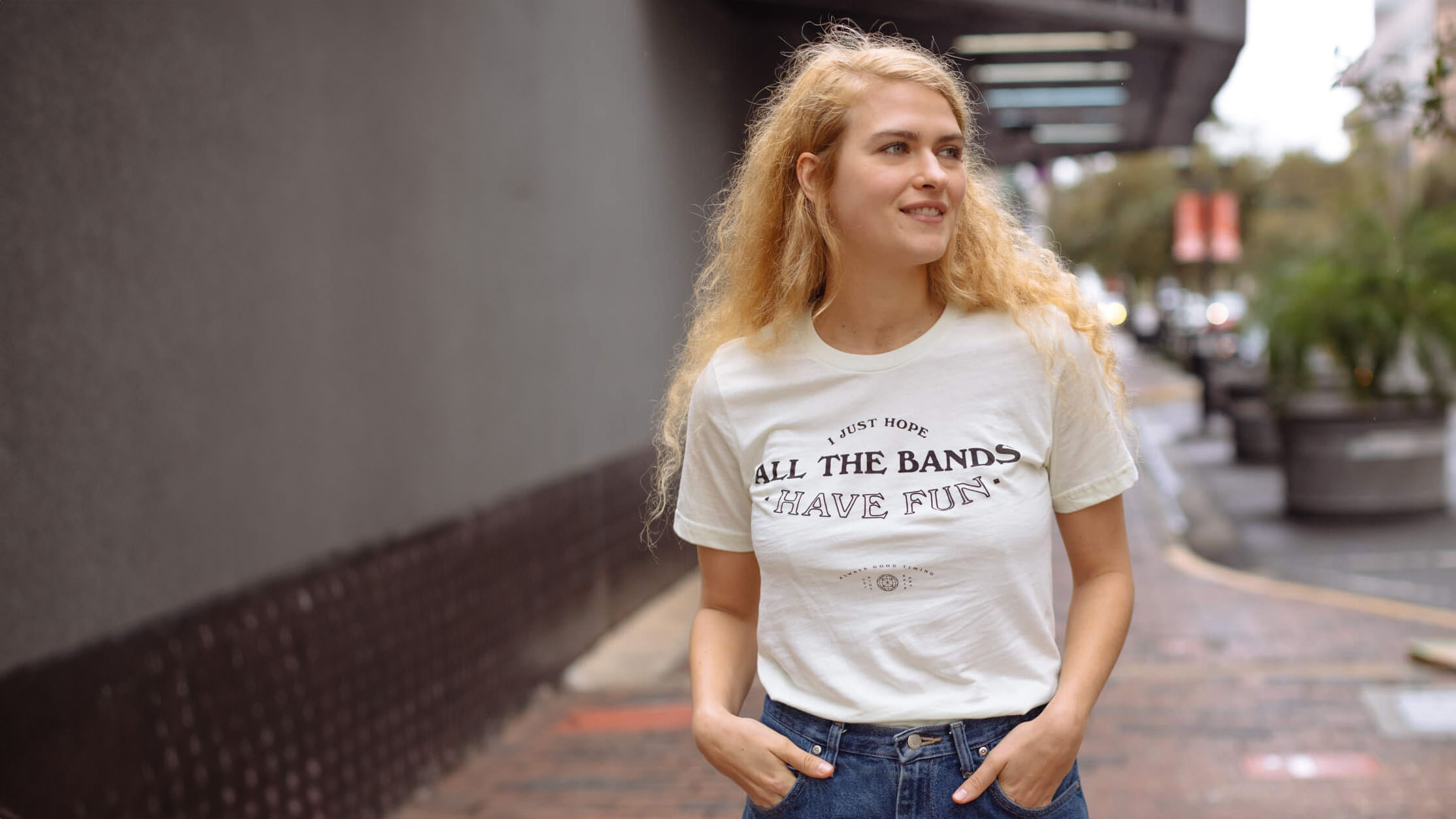Good for the planet & its people
This is Allmade’s attitude when it comes to apparel manufacturing. Allmade is dedicated to crafting eco-friendly apparel that puts the needs of its customers and the planet first. It began with a desire to create a great t-shirt to print on but ended with a t-shirt you can feel great about from an environmental standpoint as well.
in this post, we'll take a look at how Allmade got started, their impact on the planet since, and get an exclusive interview from their founder and CEO, Ryan Moor.
How it all started
In 2016, Allmade’s team traveled to Haiti to learn about the social and environmental impacts of apparel manufacturing. What they saw changed the mindset and lives of their team. They realized they could have an impact, to empower the people of Haiti to take care of their community by creating dignified fair wage jobs.
The ultimate goal for Allmade is to save water, reuse bottles, and reduce the carbon footprint of their products. To practice their commitment, Allmade has saved 452 million gallons of water and recycled 8.3 million plastic water bottles, reducing 1.7 million kilograms of Co2 since 2016.
Community First
Allmade has always made an effort to positively impact the communities that their workers are based. Products are manufactured sustainably in ethical factories in the USA, Haiti, and Honduras. One of their main concerns is building better jobs and a better community around them.
The Elcatex partner factory in Honduras is dedicated to being a pioneer in environmental sustainability by investing in renewable energy and reducing their water and chemical usage.
MAZAVA is one of the partnered factories in Haiti. Their specialty lies in synthetic materials. This helps Allmade achieve the recycled polyester portion of their signature tri-blend.
The LIFE S.A. partner factory in Haiti is owned by the GO Project. All of its profits go directly to orphan-related initiatives, such as their orphan care programs across 20 countries. Allmade is a strong believer in fair wages no matter where you are in the world. The workers at LIFE make on average 3-4x more than the local minimum wage.
Many of Allmade’s custom label programs go through Tenessee at Volunteer Knitwear. They provide clients with a high-quality USA-made label.
Throughout all of their partnered factories, Allmade has more than 3,500 employees.

Making Your Impact Transparent
Allmade has even incorporated a feature that calculates the environmental impact of your t-shirt. It shows you the amount of water saved, the amount of Co2 that was reduced, and the amount of recycled plastic in pounds your order has saved. This feature allows you to compare Allmade’s tri-blend to traditional cotton, 50/50 blends, and other tri-blends. The impact calculator also takes the number of garments that you’re looking to purchase into consideration as well. If you’re interested to see the impact of your order, check out the Allmade calculator here.
An interview with the Founder and CEO of Allmade, Ryan Moor
Can you tell us about what you’ve seen in global manufacturing and how it affected your approach to apparel?
When I entered the industry there didn’t seem to be good options for quality blanks, I vaguely remember hearing “organic cotton” but I didn’t know much about it and it didn’t seem to be in line price-wise. Like Real Thread, our first venture into what it means to be “eco” friendly in apparel manufacturing was with the water-based inks in the late part of the 2000s. The ability to create a better, softer, and more eco-friendly print immediately lead to looking for better and softer t-shirts.
It wasn’t however until I was introduced to our first partners in Haiti, the Global Orphan Project that I really started to open the book on global apparel manufacturing. My first trip to Haiti opened up a new search for information and passion for sharing better solutions for a brighter tomorrow for the people and planet that the apparel industry impacts.
Since your 2016 trip to Haiti, what have you done differently in your own personal life in regards to sustainability?
The first trip to Haiti was eye-opening for me in two facets. First, by seeing and starting to understand what real poverty was. Second, the affect on people and the planet, which opened up more questions on our impact on the planet through apparel manufacturing.
One of the issues with poverty is that it cannot hide anything. You see everything: the trash, the plastic going into the rivers and ocean, the abandoned families without the resources to take care of themselves. Worrying about the environmental impact of an action is at the bottom of the list. How do we as a 1st world society try to solve this? We send donations, we send aid, often inadvertently enabling poverty and environmental destruction.
I saw thousands of people without work, driving down the job market and price of labor, I saw thousands of clothes that were “donated” literally combing the sides of river banks and beds of rivers. It was eye-opening and it inspired further research and active change.
I’ve since learned from the following books and documentaries: Poverty Inc. The True Cost, Let My People Go Surfing, The Empire of Cotton, Fashionopolis, as well as taking over 12 trips to apparel manufacturing countries worldwide. I would encourage you to research for yourself, read for yourself, and travel (when safe) yourself because what you will learn will change how you shop, buy, make, and help others and the planet.
How has it impacted me?
Shop less, but nicer. If you are going to buy something make sure it lasts. Spend a little more to ensure that happens.
Look at the label –– what’s in the product, where was it made?
Think about tomorrow. Reuse more. Buy carbon offsets for travel. Invest in and learn about renewable energy and practices.
Help more, but in sustainable ways. Donate or invest in the training of fishermen, not the feeding of fish. Invest in your own supply chain, both personal and from a company level. Because the power of every dollar is way more powerful than a small percentage of a few.
Did you face any challenges in getting your team on board with the eco-friendly values of Allmade?
Our team very much embraced the ideas and research. We became green-certified in our county and started Project 376 at Allmade’s parent company Ryonet to get rid of chemicals and waste in the screen printing industry. Maybe it’s because we are from the NW, or maybe it’s because once you know the truth, you are compelled to act, but everyone jumped in. We aren’t perfect but we make improvements every day to get better.
Could you tell us about the relationship between yourself and our CEO, Dru?
I’ve always known about and respected Real Thread for the technology, quality, and growth the company has produced since its inception. A few of our team members got to know some of the members of the Real Thread team and visited the shop a few times. And I heard nothing but amazing things.
Dru and the team were always friendly at shows. But we really didn’t start talking seriously about things until 2019 when one of our founders prompted me to personally reach out to Dru and try to connect a great company like Real Thread to a great product and cause like Allmade.
We have done a lot together since t-shirts, better machinery, processes, and even face masks! I have appreciated the travel and everyone I have gotten to know at the company. You can tell Dru is a great leader, visionary, and hard worker and those are the types of people and relationships I want to align with and invest in.
What does the future of Allmade look like?
We are excited to move forward and expand our product line and manufacturing capacity with a new relationship with one of the largest industry manufacturers, SanMar. Starting a clothing brand from scratch has been hard and we had to scratch for every penny of the millions it took to get off the ground.
SanMar has been up and running in this space for over 50 years, their family values treat people and how they make things exactly in line with our values. What we make things out of and how we interact with those we make with is something that Allmade does a little differently. And so combined we have the resources, passion, connection, and progress to do some amazing things in the future.
From a product perspective, we are going to be adding more colors of our Tri-Blend as well as more colors and fabrics in Organic Cotton, which will be sourced in India, along with a 50/50, and a few different options for fleece that are all eco-friendly. I’m excited to continue to share what we learn on this journey, invite customers and clients to come along with us, digitally and physically as we make the world a better place, one t-shirt at a time!
How has Allmade adapted to the pandemic?
We were fortunate to have a lot of our eco-friendly fabric on hand and relationships with US manufacturers to produce PPE when it was urgently needed. The Allmask has done extremely well from a consumer review perspective which was our goal in making the first eco-friendly mask to hit the market.
It’s soft, fitted, flexible, and eco-friendly which makes it not only effective but comforting - physically, and emotionally. Thanks to great relationships like Real Thread, who has become our largest customer of the masks, we have been able to donate close to 50,000 masks to front line workers, those in need, and equality movements. Not only helping to spread the brand but helping to stop the spread of the virus.
Though the virus slightly delayed our launch with SanMar we were still successfully able to launch and we got a highly reviewed and loved product because of it.
Our favorite Allmade products

At Real Thread, we offer the A2004T. This blank features Allmade’s unique Tri-Blend material which is built from 50% Repreve ® polyester, 25% ring-spun cotton; and 25% TENCEL ™ Modal which is made from renewable beech trees.
.jpg)
We also offer the Allmade Allmask. This mask also features a reusable eco Tri-Blend that allows the mask to be light, breathable, and soft all at once. The adjustable nose wire also helps with having a more personal fit and even helps reduce glasses from fogging up.
We've got your t-shirt face mask and needs covered.
Together, we can navigate getting the right custom product made for you, your team, and your brand. We'll walk you through each of our products and answer any questions you have about any eco-friendly processes. Check out our Product Builder or send an email to team@realthread.com to get your order started. If you're looking for face masks for just yourself, click here.








.svg)